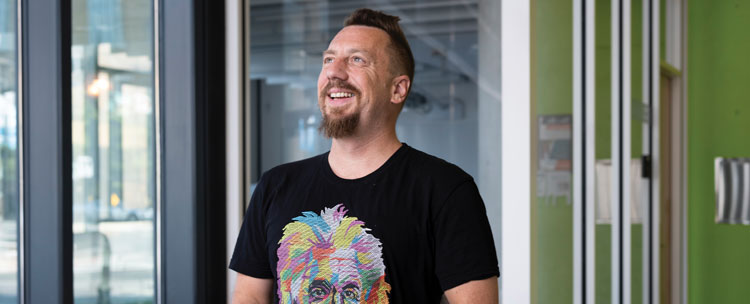
Photo by David Hills/ABA Journal
Starger was working as a software engineer at a startup firm in Silicon Valley when he participated in protests in San Francisco over the subsequent not-guilty verdict for the involved officers. He got arrested and spent a couple of days in jail.
“I really saw how badly people were treated,” says Starger, 49, an associate professor at the University of Baltimore School of Law.
Starger quit his job, moved to Turkey and taught English. When he returned, he got involved in prisoners’ rights activism and became a lawyer.
After graduating from Columbia Law School in 2002, he clerked for a year in the U.S. District Court for the Southern District of New York and worked as a staff attorney at the Innocence Project at the Benjamin N. Cardozo School of Law.
“As I was dealing with piles and piles of cases, I started to try to map it out in my head and then on paper,” he says. “I realized it was something that would be much better done by a computer.”
Starger introduced the SCOTUS Mapping Project, an online tool that allows users to chart competing lines of Supreme Court majority and dissenting opinions. “He is simultaneously a Supreme Court expert and then taking on all of this technical work in order to expand the impact that he can make,” says Michael Lissner, executive director of the Free Law Project.
Starger had been at the UB School of Law for nearly five years when the death of Freddie Gray from injuries sustained in police custody sparked protests across the city in 2015. He began working with protesters and was at the Office of the Public Defender when he ran into former student Zina Makar.
Makar proposed a new pretrial detention clinic and asked Starger to get involved.
“That clicked very much with my desire to do social justice work, and it specifically connected to the problem of mass incarceration, which is something I had been thinking about for 20 years at that point,” Starger says.
Together with Makar, he started the Pretrial Justice Clinic, which is designed to combat mass incarceration through bail-related litigation and reform, at the UB School of Law in 2016.
Starger brought his technological savvy, working with 2017 Legal Rebel Matthew Stubenberg to access Maryland court records to identify specific dockets where judges unfairly detained defendants or held them on unaffordable bonds.
“He has been able to teach students in our clinic how to mine information and identify potential clients more quickly as opposed to going into a courtroom and observing and finding a case,” Makar says. “You can do it from your computer, and it saves so much time.”